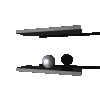 A particle bouncing between a fixed and an oscillating
wall is an example of a dynamical system which shows
a mixture of regular and chaotic behavior.
One can study this dynamical system through a
Poincaré map
A particle bouncing between a fixed and an oscillating
wall is an example of a dynamical system which shows
a mixture of regular and chaotic behavior.
One can study this dynamical system through a
Poincaré map
 .
The variable u is the speed of the particle just
before hitting at time t the wall in position cos(t).
The image point is determined by the speed u1 of
the particle when it leavs the wall the next time
t1. The time variable is taken modulo .
The variable u is the speed of the particle just
before hitting at time t the wall in position cos(t).
The image point is determined by the speed u1 of
the particle when it leavs the wall the next time
t1. The time variable is taken modulo
 so that P is an area-preserving map of the half-cylinder
so that P is an area-preserving map of the half-cylinder
 . .
|
The return map P is smooth on X if one assumes
that the moving wall imparts momentum ( - sin(t))
to the ball but stays at a fixed position.
Let l be the average distance between the fixed and moving
wall and let v the speed of the particle. Assuming no gravity,
an approximation to P is
 This simplified Fermi map is the composition of two maps,
the instantaneous velocity gain
This simplified Fermi map is the composition of two maps,
the instantaneous velocity gain
 at the impact time t and the following free motion
at the impact time t and the following free motion
 until the next impact.
until the next impact.
|
The fixed points  of F are labeled
by a positive integer m. They correspond to initial speeds which lead
to a periodic return after m floor-oscillations, hitting when the
floor is at a lowest rsp. highest point (the animation on this page
is such a fixed point with m=1). A linearization in the variable
v near
of F are labeled
by a positive integer m. They correspond to initial speeds which lead
to a periodic return after m floor-oscillations, hitting when the
floor is at a lowest rsp. highest point (the animation on this page
is such a fixed point with m=1). A linearization in the variable
v near
 using
1/(v+u) = 1/v - 1/v2 u + O(u 2) leads to the map using
1/(v+u) = 1/v - 1/v2 u + O(u 2) leads to the map
 with parameter
with parameter
 .
After a change of variables .
After a change of variables
 ,
this is ,
this is
 which is conjugated by the discrete involutive Legendre transformation
(x,y)=(-q,p-q) to the
Standard map
which is conjugated by the discrete involutive Legendre transformation
(x,y)=(-q,p-q) to the
Standard map

|
 A particle bouncing between a fixed and an oscillating
wall is an example of a dynamical system which shows
a mixture of regular and chaotic behavior.
One can study this dynamical system through a
Poincaré map
A particle bouncing between a fixed and an oscillating
wall is an example of a dynamical system which shows
a mixture of regular and chaotic behavior.
One can study this dynamical system through a
Poincaré map